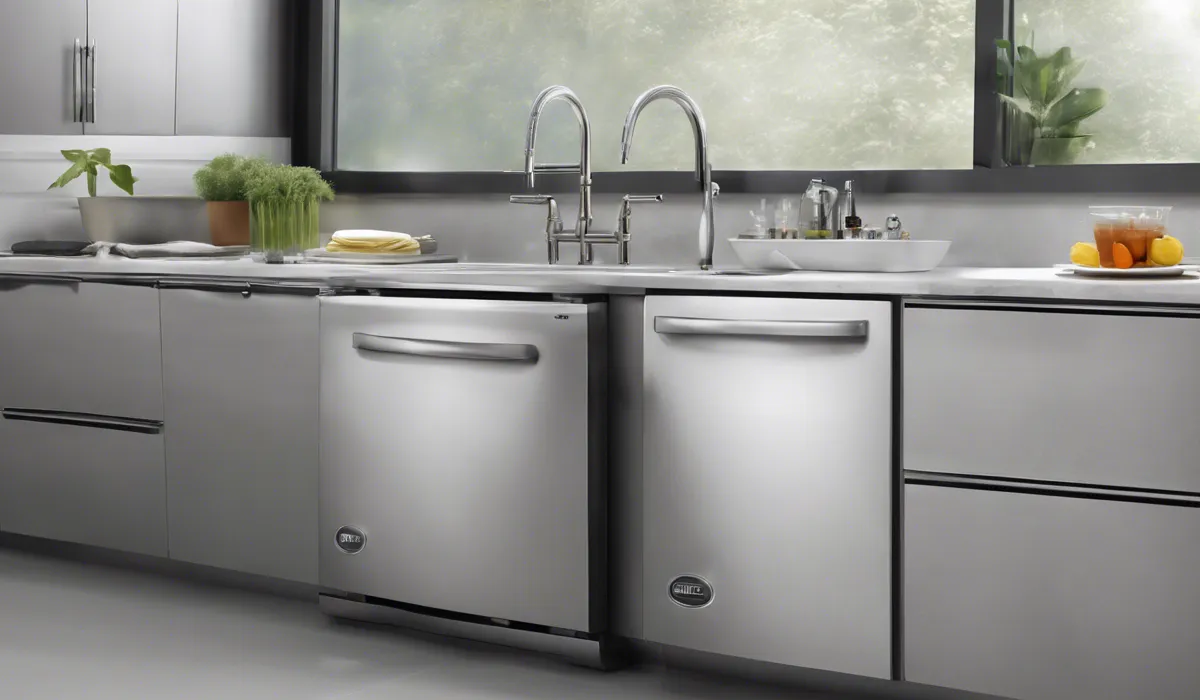Do Stainless Steel Dishwasher Tubs Rust? Unveiling the Truth
Stainless steel dishwasher tubs are highly resistant to rust due to the material’s natural properties. However, prolonged exposure to harsh chemicals or salts can cause tiny pits or rust spots to form. Regular maintenance and prompt cleaning of food debris or detergents help prevent rusting.
Understanding Stainless Steel Dishwasher Tubs

Composition of Stainless Steel
Stainless steel is an iron alloy that includes a variety of elements such as chromium, nickel, and molybdenum. The presence of at least 10.5% chromium is what gives stainless steel its signature resistance to corrosion.
Chromium forms a passive layer of chromium oxide on the surface that protects the material from rust and staining. This layer is self-healing, which means that if it’s scratched or damaged, it can reform and continue to protect the steel.
Properties of Stainless Steel Relevant to Dishwasher Tubs
Stainless steel is celebrated for its durability and resistance to corrosion, which are essential properties for dishwasher tubs that are constantly exposed to water and various chemicals.
This material also withstands high temperatures without degrading and is less likely to absorb odors or become discolored over time compared to other materials.
Additionally, stainless steel is a non-porous material, which means it does not harbor bacteria or germs easily, ensuring a more hygienic environment for washing dishes.
Comparison with Other Materials Used in Dishwasher Tubs
Common alternatives to stainless steel dishwasher tubs include plastic and hybrid tubs.
Plastic tubs are typically less expensive but are more prone to staining and can retain odors over time. They are also more susceptible to warping or damage under high temperatures.
Hybrid tubs, which combine stainless steel with a plastic base, offer a middle ground, providing some of the benefits of stainless steel while keeping costs down.
However, they do not offer the same level of durability and heat resistance as full stainless steel tubs.
Benefits of Stainless Steel Tubs in Dishwashers
Stainless steel tubs provide numerous benefits including longevity, enhanced drying performance due to better heat retention, and a sleek, modern aesthetic that complements any kitchen design.
They are also more energy-efficient, as they retain heat better than plastic, leading to less energy required to dry dishes.
Moreover, the robustness of stainless steel makes these tubs capable of withstanding the rigors of dishwashing without compromising their integrity or appearance.
Factors That May Cause Rust in Stainless Steel Dishwasher Tubs

Presence of Water and Oxygen
While stainless steel is inherently resistant to rust, constant exposure to water and oxygen can eventually lead to corrosion, especially if the protective chromium oxide layer is compromised.
This is why even high-quality stainless steel dishwasher tubs can sometimes develop rust spots.
Chlorides and Harsh Chemicals in Detergents
Many cleaning agents contain chlorides, which can be aggressive on stainless steel surfaces if they are left to sit for extended periods.
These substances can break down the protective layer on the steel, making it vulnerable to rust. It is crucial to choose the right detergents and rinse aids that are compatible with stainless steel.
Improper Maintenance and Cleaning Practices
Not following proper maintenance can put your stainless steel dishwasher at risk of developing rust.
Leaving acidic food residues, such as tomato sauce or vinegar, can damage the protective layer over time. Similarly, using abrasive cleaners or steel wool can scratch the surface, leading to corrosion.
Damage to the Protective Chromium Oxide Layer
The chromium oxide layer on stainless steel is what prevents rust, but it can be damaged by hard impacts or metal scouring pads. If this layer is compromised, the underlying metal can rust.
Careful handling and cleaning of the dishwasher tub are essential to maintain this protective layer.
Contact with Non-Stainless Steel Items Causing Galvanic Corrosion
When stainless steel comes into contact with other metals in the presence of an electrolyte, such as water, it can lead to galvanic corrosion.
This occurs because of the different metals’ potential to attract electrons, which can lead to the deterioration of the stainless steel. It is important to avoid mixing different metal types in the dishwasher.
Water Quality Factors Such as High Mineral Content
Hard water, which is high in mineral content, can leave deposits on stainless steel surfaces that not only look unsightly but can also contribute to corrosion over time.
These mineral deposits can create spots where moisture gathers, leading to rust if not properly managed.
Preventative Measures and Solutions for Rust in Stainless Steel Dishwasher Tubs

Proper Usage and Loading Techniques
Ensuring that you load your dishwasher correctly can help prevent damage to the stainless steel tub.
Place sharp objects so they are less likely to scratch the tub, and avoid overcrowding, which can cause items to knock against each other and the tub walls during the wash cycle.
Regular Cleaning and Maintenance Routines
Maintaining a regular cleaning schedule for your dishwasher can prevent rust from forming.
This includes wiping down the interior, checking the filter for trapped food particles, and running an empty cycle with a dishwasher cleaner designed for stainless steel tubs.
Choosing the Right Detergents and Rinse Aids
Selecting detergents and rinse aids that are specifically formulated for use with stainless steel can help avert rust formation. These products are designed to be gentle on the protective oxide layer while still providing a thorough clean.
Treatment Options for Minor Rust Spots
If you notice small rust spots forming, it’s important to address them promptly. Commercial stainless steel cleaners can remove these spots and help re-passivate the surface.
In some cases, a paste made from baking soda and water can also be used to gently buff away the rust without damaging the tub.
Repairing Damaged Stainless Steel Surfaces
If the rust is due to a deep scratch or dent, it might be necessary to repair the damaged area to prevent further corrosion. Stainless steel filler kits are available for this purpose, and they can restore the integrity of the protective oxide layer.
Professional Maintenance and Replacement Advice
In the case that rust has become a significant issue, it may be wise to seek professional advice.
A technician can assess whether the tub can be salvaged through professional-grade treatments or if a replacement is the best course of action to ensure the longevity and efficiency of your dishwasher.
FAQs About Stainless Steel Dishwasher Tubs Rust
Can stainless steel dishwasher tubs develop rust?
Yes, stainless steel dishwasher tubs can develop rust spots if exposed to harsh chemicals or salts for prolonged periods.
What causes stainless steel dishwasher tubs to rust?
Tiny pits or rust spots on stainless steel dishwasher tubs can be caused by prolonged exposure to harsh chemicals, salts, and neglect in cleaning food debris or detergents.
How can you prevent rusting in stainless steel dishwasher tubs?
Preventing rust in stainless steel dishwasher tubs involves regular maintenance, prompt cleaning of food debris, and avoiding the use of harsh chemicals.
Are there any maintenance tips to prevent rust in stainless steel dishwasher tubs?
Regular maintenance tips include wiping down the tub after use, using recommended detergents, and occasionally inspecting for signs of wear or damage.
Is rusting a common issue with stainless steel dishwasher tubs?
Rusting is not a common issue with stainless steel dishwasher tubs due to their rust-resistant properties, but it can occur if they are not properly maintained.
Final Thoughts
Stainless steel dishwasher tubs boast a natural resistance to rust. Yet, they’re not impervious—excessive contact with harsh chemicals or salts can lead to pitting or rust spots.
Upholding a routine of regular maintenance and swift removal of food particles and detergent residues is crucial in safeguarding against rust development.





